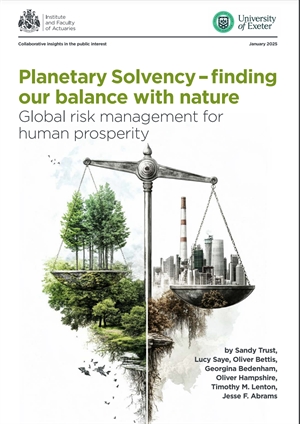Global GDP could fall 50% over 20 years without climate action - Actuaries report
Thu 16 January 2025
View all news

A report from the Institute & Faculty of Actuaries (IFoA) and supported by the Government Actuaries Department says that the global economy could face a 50% loss in GDP between 2070 and 2090, unless immediate policy action on risks posed by the climate crisis is taken.
The report - ‘Planetary Solvency – finding our balance with nature’ says that populations are already impacted by food system shocks, water insecurity, heat stress and infectious diseases. If unchecked, mass mortality, mass displacement, severe economic contraction and conflict become more likely.
The report, which has been co-authored by an actuary from the Government Actuaries Department, is the IFoA’s fourth report in collaboration with climate scientists. It develops a framework for global risk management to address these risks and show how this approach can support future prosperity.
It also shows how a lack of realistic risk messaging to guide policy decisions has led to slower action than is needed.
The report proposes a novel Planetary Solvency risk dashboard, to provide decision-useful risk information to support policymakers to drive human activity within the finite bounds of the planet that we live on.
Sandy Trust, Lead author and IFoA Council Member, said: “You can’t have an economy without a society, and a society needs somewhere to live. Nature is our foundation, providing food, water and air, as well as the raw materials and energy that power our economy. Threats to the stability of this foundation are risks to future human prosperity which we must take action to avoid.
“Widely used but deeply flawed assessments of the economic impact of climate change show a negligible impact on GDP, rendering policymakers blind to the immense risk current policy trajectories place us in. The risk led methodology, set out in the report, shows a 50% GDP contraction between 2070 and 2090 unless an alternative course is chartered.”
The Government Actuaries Department in a website post says that Planetary Solvency is defined as ‘managing human activity to minimise the risk of societal disruption from the loss of critical support services from nature’. It assesses the ability of our planet now, and in the future, to support human society and the economy.
Five key recommendations are put forward to mitigate the risk of ‘Planetary Insolvency’:
- implement Planetary Solvency assessments to provide clear global systemic risk information for realistic and effective global risk management
- set Planetary Solvency limits that respect planetary boundaries, including revisiting climate goals and developing metrics to monitor planetary health
- enhance governance structures to formalise Planetary Solvency and provide transparent, easy-to-digest assessments for relevant bodies and the public
- build policymaker capacity on systemic risk management, enhancing understanding of the risks and interdependencies, and embedding risk outputs within current risk management processes
- The Earth provides ecosystem services, such as provision of food and water and regulation of the climate, that support our society and the economy. Human activity has a profound influence on the Earth’s natural systems. This interaction is having a significant negative impact, driving extreme weather events and habitat loss, and risks pushing our planet into a much less habitable state.
Actuaries traditionally use their risk management expertise to help decision-makers understand the risk of financial insolvency. Planetary Solvency applies these techniques to the Earth system to ensure we minimise risks and keep activities within planetary boundaries.
Related Links
< Back to news list